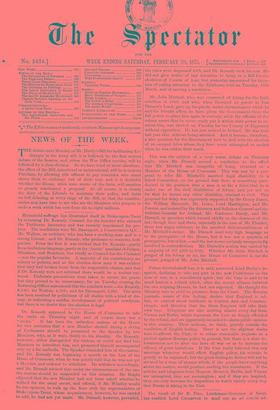This was the subject of a very warm debate on
Thursday night, when Mr. Disraeli moved a resolution to the effect that Mr. Mitchell was incapable of being returned as a Member of the House of Commons. This was met by a pro- posal to refer Mr. Mitchell's asserted legal disability to a Select Committee, on the ground that there is something para- doxical in the position that a man is so far a felon that he is under one of the civil disabilities of felony, and yet not so far that he incurs any other disability, criminal or civil. This proposal for delay was vigorously supported by Sir Henry James, Sir William Harcourt, Mr. Lowe, Lord Hartington, and Mr. Forster, and resisted by the Attorney and Solicitor-General and the Solicitor-General for Ireland, Mr. Gathorne Hardy, and Mr. Disraeli, in speeches which turned chiefly on the clearness of the law, though here and there, especially in the case of Mr. Pluuket, there was angry reference to the asserted dishonourableness of Mr. Mitchell's escape. Mr. Disraeli used very high language as to the prerogative of the House, but it was not a question of prerogative, but of law,—and the law seems certainly unexpectedly involved in contradictions. Mr. Disraeli's motion was carried by a majority of 167 (269 to 102). Whether Mr. John Mitchell is purged of his felony or no, the House of Commons is, for the present, purged of Mr. John Mitchell.


































